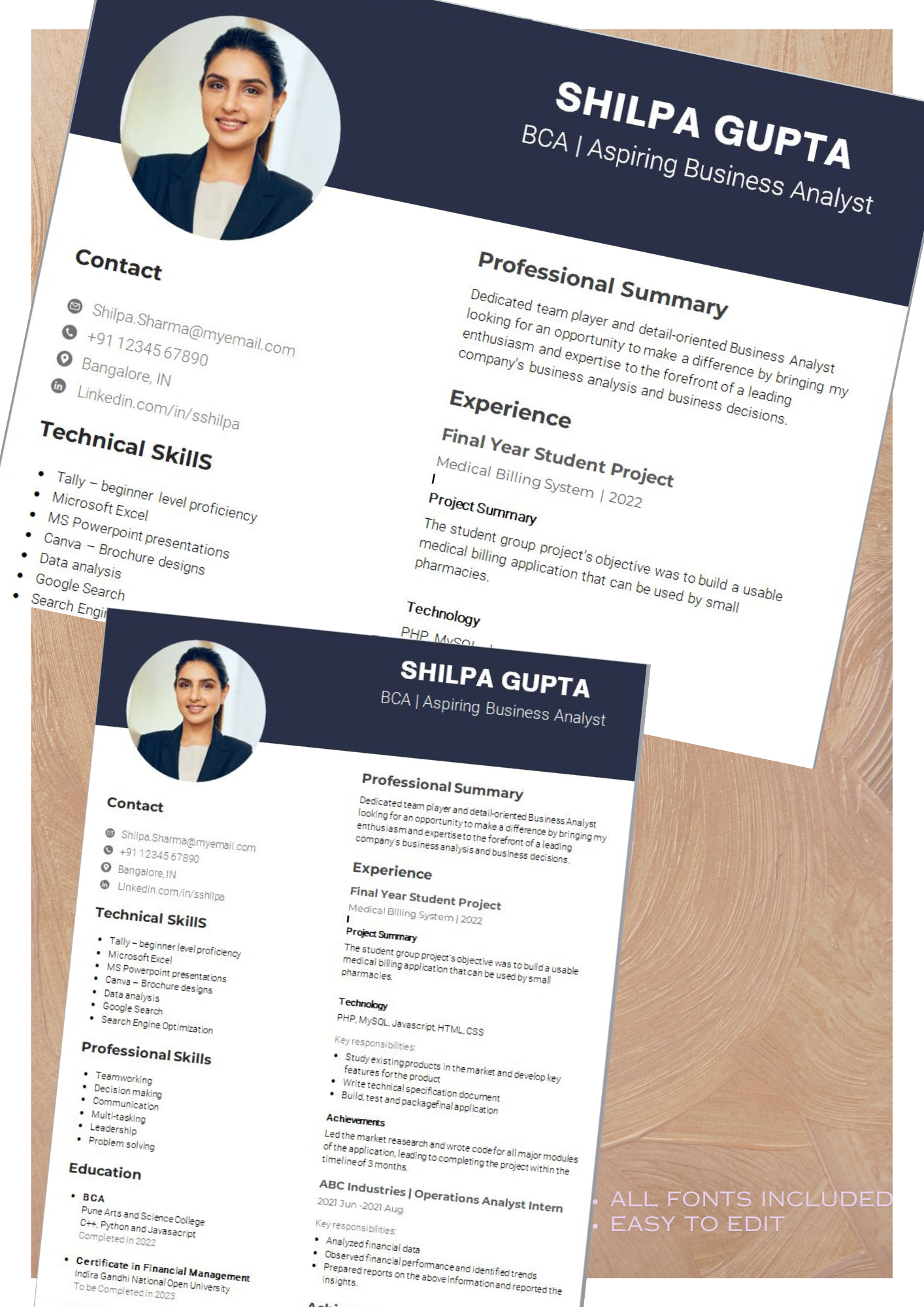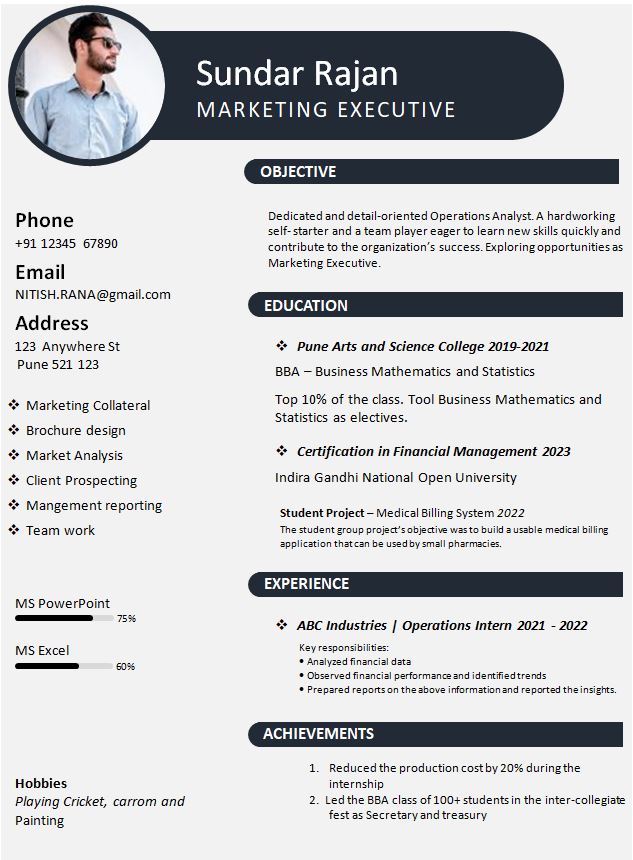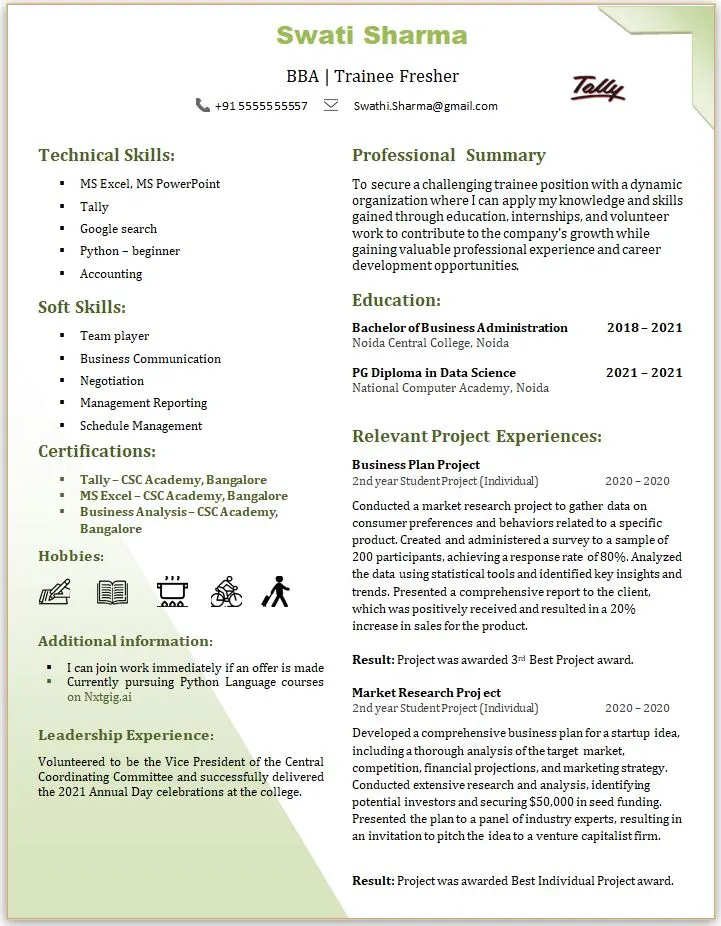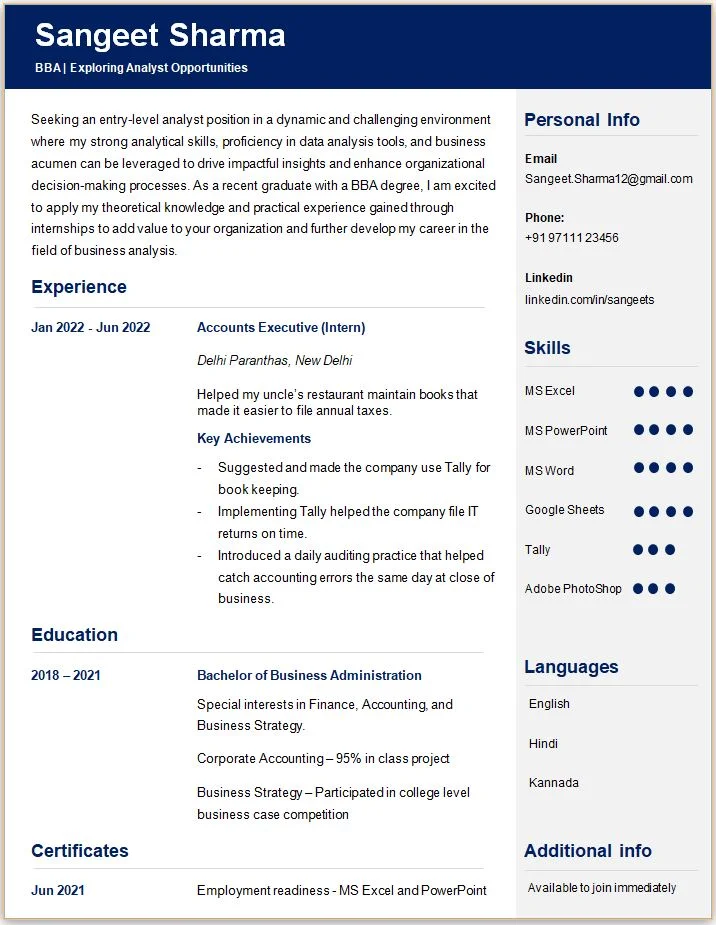Modern Resume
BCA Fresher Resume
Free resume template
BCAAn


Objective
As a recent BCA graduate, I am enthusiastic about launching my career as a Business Analyst in the IT industry. With strong analytical skills and a technology-driven mindset, I aspire to contribute to operational efficiency and strategic decision-making. Seeking a dynamic role to apply my technical acumen and foster growth through innovative solutions.
Education
BCA, BBA, BE, BTech, BCom, BA, BSc
Skills
You will help yourself if you focus on learning these skills below as these are some of the most sought after skills in the industry; additionally, since these are also relatively easier to master, these skills make the best beginner skill-sets to aim at possessing for those fresh college graduates aiming to enter the job market as Business Analyst.
PHP:
While PHP is traditionally associated with web development, having a basic understanding is beneficial. It demonstrates your versatility and awareness of web technologies. For a Business Analyst, knowledge of PHP might be particularly useful when dealing with projects that involve web applications or databases.
Microsoft Excel:
Excel is a fundamental tool for data analysis, reporting, and visualization. As a Business Analyst, you'll frequently work with data sets, and Excel skills are crucial for tasks like data cleaning, creating pivot tables, and generating insights. Proficiency in Excel showcases your analytical abilities.
MS PowerPoint Presentations:
Effective communication is a key aspect of a Business Analyst's role. PowerPoint is widely used for creating presentations to convey complex information in a clear and visually appealing manner. This skill demonstrates your ability to articulate and present findings to stakeholders.
Canva – Brochure Designs:
While not a traditional requirement, graphic design skills can set you apart. Creating visually appealing documents, such as brochures, can enhance your ability to communicate ideas. In some scenarios, you might need to present findings in a visually engaging way, making Canva skills valuable.
Data Analysis:
Business Analysts deal extensively with data. Skills in data analysis, including the ability to interpret trends, draw conclusions, and make recommendations, are critical. Familiarity with tools like Excel, SQL, or business intelligence software is highly sought after in the industry.
Google Search:
Efficient research is a crucial skill for a Business Analyst. Knowing how to conduct effective searches on Google demonstrates your resourcefulness and ability to gather information, a skill vital for market research, industry analysis, and staying updated on trends.
Search Engine Optimization (SEO):
Understanding SEO principles can be beneficial when dealing with projects related to online platforms. It reflects your awareness of digital marketing strategies and how they can impact business decisions, especially in industries where online presence is vital.
In summary, these skills showcase a well-rounded profile. While technical skills are essential for data-driven decision-making, soft skills like effective communication and design can enhance your ability to convey complex information in a business context. It's the combination of these skills that will make you stand out as a candidate. Let us know what you think.
Projects
Projects are one of the few opportunities that fresh college graduates have to show they possess technical skills and they leveraged their soft skills in delivering something substantial as a student; but, you have to strategic about deciding which project to work on long before you even submit your project idea to the college.
The process of identifying a project idea starts ideally in your second year if your college mandates projects be completed in the final year.
Choosing a college project is a significant step in your academic journey, and aligning it with your career aspirations in the technology industry is a smart approach.
Here are five tips to help you pick a good college project:
Identify Your Interests:
Choose a project that aligns with your interests within the technology industry. This could be a specific programming language, technology stack, or a domain like artificial intelligence, cybersecurity, or web development. When you're passionate about the subject, you're more likely to stay motivated and engaged throughout the project.
Relevance to Industry Trends:
Stay updated on current trends in the technology industry. Choose a project that reflects emerging technologies or addresses current challenges. This not only demonstrates your awareness of industry trends but also makes your project more valuable when showcasing your skills to potential employers.
Problem-Solving Focus:
Opt for a project that involves solving a real-world problem. It could be a local community issue, an efficiency challenge in a particular industry, or a common problem faced by users. This approach adds practical value to your project and showcases your problem-solving skills, a key trait in the technology field.
Collaborative Opportunities:
Consider projects that offer collaboration opportunities with industry professionals, other students, or academic mentors. Collaborative projects often provide a richer learning experience and allow you to network with individuals who may offer valuable insights or even potential career opportunities.
Scalability and Innovation:
Aim for a project that has room for scalability and innovation. This could involve incorporating features that allow for future enhancements or exploring novel approaches to solving a problem. Demonstrating your ability to think creatively and anticipate future developments is highly valued in the tech industry.
Remember that your college project is not just an academic requirement; it's a chance to showcase your skills, interests, and potential to future employers. Take the opportunity to learn, explore, and make a meaningful contribution to the field you aspire to be a part of.
Let us know what you think or if you need any help with identifying your college project.
Additional Inputs
If you are a fresh college graduate or just about to graduate, interviews will be on top of your mind. A lot of fresh graduates tend to think that interviews are a question and answer session where the interviewer asks questions and the candidate answers them. It is not. It will serve you better if you approached interviews as an opportunity to discuss with the employer your aspirations. To help fresh graduates we have put together a few common questions that appear in the interviews of fresh graduates.
1. Question: Can you describe a situation where you had to work in a team to achieve a common goal?
Example Answer: "During a group project in my final year, my team and I had to develop a software application. I took the initiative to organize regular meetings, allocate tasks based on each member's strengths, and ensured effective communication. This experience improved my collaboration and leadership skills."
Why it's a good choice: This question assesses teamwork, leadership, and communication skills, which are vital in most professional settings.
2. Question: How do you handle stress and tight deadlines?
Example Answer: "In my previous internship, we faced a tight deadline for a project. I prioritized tasks, created a schedule, and focused on one task at a time. This helped me manage stress and ensure the quality of our work."
Why it's a good choice: This question evaluates a candidate's ability to handle pressure and meet deadlines, crucial skills in fast-paced work environments.
3. Question: Can you share an example of a time when you had to adapt to a new situation or change?
Example Answer: "During a software upgrade at my internship, I had to quickly learn the new system. I enrolled in online courses, sought guidance from colleagues, and successfully adapted to the changes."
Why it's a good choice: Adaptability is essential in dynamic workplaces, and this question assesses a candidate's openness to change.
4. Question: How do you handle constructive criticism?
Example Answer: "In my coursework, I received feedback on a programming assignment. Instead of taking it personally, I used it as an opportunity to improve. I revised my work, applied the feedback, and achieved a better result."
Why it's a good choice: This question examines a candidate's ability to learn from feedback and continuously improve, showcasing a growth mindset.
5. Question: Describe a situation where you had to resolve a conflict within a team.
Example Answer: "During a group project, two team members had different ideas about the project's direction. I facilitated a discussion, encouraged each member to express their views, and helped the team find a compromise that everyone could agree on."
Why it's a good choice: Conflict resolution skills are crucial for maintaining a positive team dynamic, and this question assesses how well a candidate can navigate such situations.
6. Question: How do you prioritize and manage your time effectively?
Example Answer: "In college, I balanced my coursework, part-time job, and extracurricular activities. I created a detailed schedule, set priorities, and used tools like calendars and to-do lists to stay organized and meet deadlines."
Why it's a good choice: Time management is key in professional settings, and this question helps gauge a candidate's organizational skills.
7. Question: Can you share an example of a project where you demonstrated leadership skills?
Example Answer: "I led a team project where we had to develop a mobile app. I took charge of coordinating tasks, ensuring everyone's input was considered, and motivating the team to meet our goals successfully."
Why it's a good choice: Leadership is a valuable soft skill, and this question assesses a candidate's ability to take initiative and guide a team.
8. Question: How do you approach problem-solving?
Example Answer: "When faced with a coding challenge during an internship, I followed a systematic problem-solving approach. I identified the issue, researched potential solutions, and tested different approaches until I found the most effective one."
Why it's a good choice: Problem-solving skills are crucial in technical roles, and this question evaluates a candidate's methodical approach to challenges.
9. Question: Can you provide an example of a time when you went above and beyond what was expected of you?
Example Answer: "In my college project, I not only completed my assigned tasks but also volunteered to create additional documentation to help the team understand the project better. This initiative contributed to the project's overall success."
Why it's a good choice: This question assesses a candidate's initiative and willingness to go the extra mile, indicating dedication and commitment.
10. Question: How do you stay motivated and keep yourself engaged in your work?
Example Answer: "I stay motivated by setting clear goals for myself. I break down larger tasks into smaller, manageable steps, celebrate small achievements, and regularly reassess my progress. This keeps me focused and engaged in my work."
Why it's a good choice: Motivation and engagement are critical for sustained productivity, and this question explores a candidate's strategies for maintaining both.


